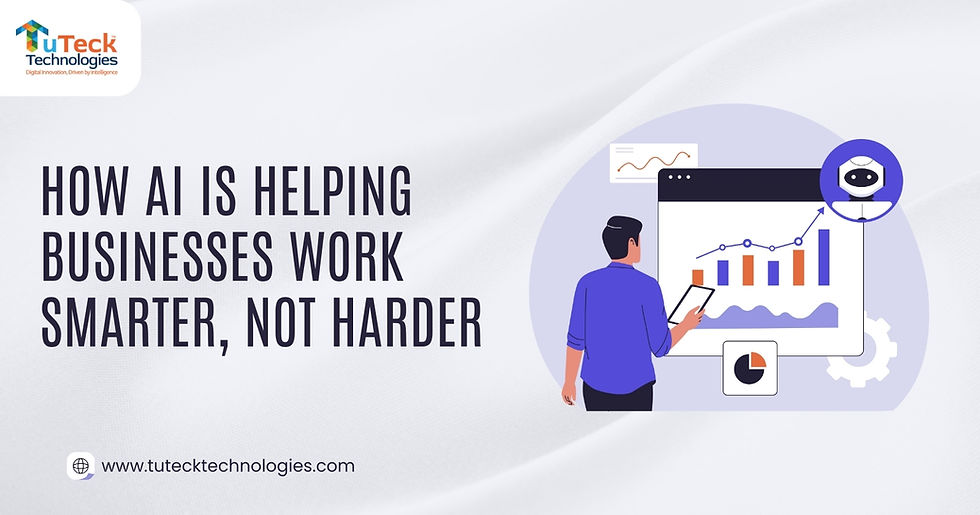The Importance of Data Integration in Business Intelligence
- Tuteck Technologies
- 1 day ago
- 3 min read

In today’s fast-moving digital world, data is at the heart of every business decision. Companies collect information from multiple sources—sales records, customer feedback, marketing campaigns, and social media platforms. But without proper management and integration, this vast amount of data remains scattered and underutilized. That’s where data integration in business intelligence becomes essential. It allows organizations to combine and analyze data efficiently, leading to better insights and smarter decision-making.
What Is Business Intelligence?
Business intelligence services refer to a set of tools, processes, and technologies that help organizations collect, analyze, and present business information. These services turn raw data into meaningful insights that drive strategic decisions. From dashboards to reports, business intelligence makes it easier for teams to monitor performance, understand customer behavior, and identify market trends.
However, one of the biggest challenges businesses face is bringing together data from various systems. This is where data integration in business intelligence plays a crucial role—it ensures that information from different sources is connected, consistent, and ready for analysis.
The Role of Data Integration in Business Intelligence

Data integration in business intelligence involves combining data from multiple sources into a single, unified view. Imagine a company that uses separate systems for sales, inventory, and customer management. Without integration, it would be difficult to get a full picture of performance. But with proper integration, all this information flows into one platform, allowing for a complete and accurate understanding of business operations.
Through data intelligence services, companies can automate the process of cleaning, transforming, and consolidating data. This not only saves time but also improves accuracy and reliability. When data is consistent and up-to-date, businesses can make informed decisions based on facts rather than assumptions.
Benefits of Data Integration for Businesses
Improved Decision-Making When data from different departments is unified, decision-makers get a holistic view of the business. They can identify trends, spot problems early, and make faster, more accurate choices using business intelligence services.
Enhanced Data Quality One of the main advantages of data intelligence services is that they ensure data accuracy and consistency. Integrated systems reduce the risk of errors caused by manual data entry or duplication.
Increased Efficiency Data integration eliminates the need to manually gather data from multiple systems. Employees spend less time compiling reports and more time analyzing insights that actually drive results.
Real-Time Analytics Businesses today need real-time insights to stay competitive. Data integration in business intelligence allows companies to access up-to-the-minute data, which is vital for responding quickly to changing market conditions.
Scalability and Flexibility As organizations grow, their data sources multiply. Integrated business intelligence systems can easily scale to include new data streams, ensuring long-term adaptability and success.
How Data Intelligence Services Support Integration

Modern data intelligence services use advanced technologies like artificial intelligence (AI) and machine learning (ML) to make integration smarter and more efficient. These tools automatically detect relationships between different data sets, clean up inconsistencies, and deliver insights faster than ever before.
Additionally, cloud-based platforms have made integration even more accessible. Businesses no longer need heavy infrastructure investments; instead, they can rely on scalable cloud solutions that make business intelligence services affordable and easy to implement.
Real-World Example
Consider a retail company that sells both online and in-store. Without data integration, it would be difficult to track overall sales performance, customer preferences, or stock levels. But when data integration in business intelligence is applied, the company can combine website analytics, point-of-sale data, and customer feedback into a single dashboard. This allows management to see what products are performing best, when demand peaks, and how marketing campaigns affect sales—all in real time.
The Future of Business Intelligence

The future of business intelligence services lies in automation, predictive analytics, and AI-powered insights. As data sources continue to expand, integration will become even more critical. Companies that invest in robust data intelligence services today will have a significant advantage tomorrow, with the ability to adapt quickly and make proactive, data-driven decisions.
Conclusion
In an age where data drives every aspect of business growth, data integration in business intelligence is no longer optional—it’s essential. By ensuring that all business information is connected, accurate, and actionable, organizations can unlock their true potential. With the right business intelligence services and advanced data intelligence services, businesses can transform complex data into powerful insights that guide strategy, boost productivity, and enhance profitability.


Comments